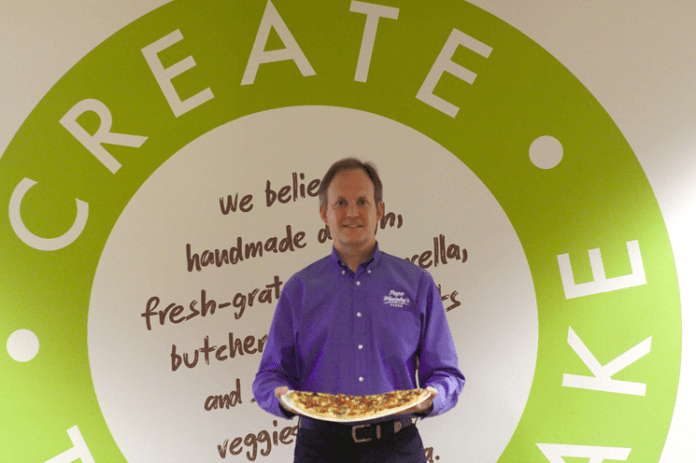The past 10 months have been a busy time for Vancouver-headquartered Papa Murphy’s. Since May of last year, the takeand-bake pizza company has become publically-traded, been faced with a lawsuit, rolled out several new products, invested in new technologies, and increased its sales figures, number of stores and the size of its corporate team.
There are no signs that things are about to slow down, either. The company is now in the process of introducing a new design concept for its stores while preparing to roll out an online ordering system.
“It has been a really good first year [as a public company],” said Ken Calwell, Papa Murphy’s CEO. “Sales trends are going the way we want them to go, and we’re seeing a good amount of reinvestment [in the company].”
In its most recent fiscal report (for the third quarter of 2014), Papa Murphy’s announced a 4.6 percent increase in store sales, including an increase of 8.4 percent at company-owned stores and an increase of 4.4 percent for domestic franchisee-owned stores.
Tempering that announcement was a reported net loss of $788,000, which, said Calwell, was related to record high cheese costs that have since dropped well below normal levels. The company reports its fourth quarter results next month.
New stores, new products With increased sales momentum, Papa Murphy’s is seeing significant reinvestment from franchisees in the form of new stores and store remodels. Much of this activity is occurring in the company’s newest market, the southeastern United States.
“We’ve invested a lot into learning more about these new markets and what it’s like to put a new Papa Murphy’s store there,” said Calwell. “Every year since I’ve been here (2011), we’ve increased the budget for that part of the country, bringing in more money to help operate stores better and bringing in more marketing dollars to work with.”
Over the past three years, Papa Murphy’s has grown from approximately 1,200 stores (31 company-owned) to more than 1,400 stores (90+ company owned). Over the same time period, the number of employees working out of the company’s corporate headquarters in Vancouver has grown from 83 to 114.
Many of the company’s new and remodeled stores are beginning to adopt a new look and feel inspired by Papa Murphy’s target customer: young moms.
“It’s like a lighter, brighter Chipotle almost,” said Calwell of the new store design. “There’s a thin sheet of glass between you and the ingredients so you can see your pizza getting made as you walk down the line. But if Chipotle is skewed toward a younger male audience, we’re more skewed to a younger female audience, and that lighter, brighter, cleaner look is appealing.”
There’s a new look behind the counter as well. Calwell said most Papa Murphy’s locations have ditched cash registers in favor of new point-of-sale (POS) systems. Already in 100 percent of company-owned stores, these systems are now in 70 percent of franchise stores, helping to drive sales and profit.
An added benefit of the POS system Papa Murphy’s is using is that it supports online orders. Calwell said the company has been testing online ordering for about three years, and is “ready to start rolling that out across the country over the next year.”
Of course, new products are part of the equation as well. Last fall, the company introduced a “Gourmet Delight” line that features pizzas with high-end toppings, 25 percent less fat and 30 percent fewer calories. A gluten free line was also introduced.
“Gluten free is tough to do and still have the right texture and flavor, but we’re real proud of the product. It has been received really well,” Calwell said.
Life after the IPO
When asked if anything feels different about the company since it raised more than $64 million during its initial public offering back in May, Calwell said it really
doesn’t.
“We tried to run the company like a public company as soon as I got here because I knew that was our goal,” he said. “We started putting things in process so it wouldn’t be a huge transition. Because of that, I think if you talk to employees it really didn’t [feel different], other than there being a bit more reporting to do.”
Lawsuit
Around the same time as the IPO filing, Papa Murphy’s was sued by a group of franchise owners who accused the company of deceptive actions, such as omitting facts about the chain’s financial performance. While the lawsuit continues, Calwell said things are now looking up.
“Our position was there was really no merit to the claims, but during the time of the IPO, because of the quiet period, we weren’t legally allowed to talk to those franchisees,” he said. “That got resolved in October of this year when a court ordered that the franchisees needed to meet with us, the leadership management team. We met with them and the great news coming out of that is a little over 60 percent of those folks in the case have dropped out and no additional people have come into it. We’re now working with that last group and it’s down to a very small number. The momentum is really good and we’re excited for the future.”




